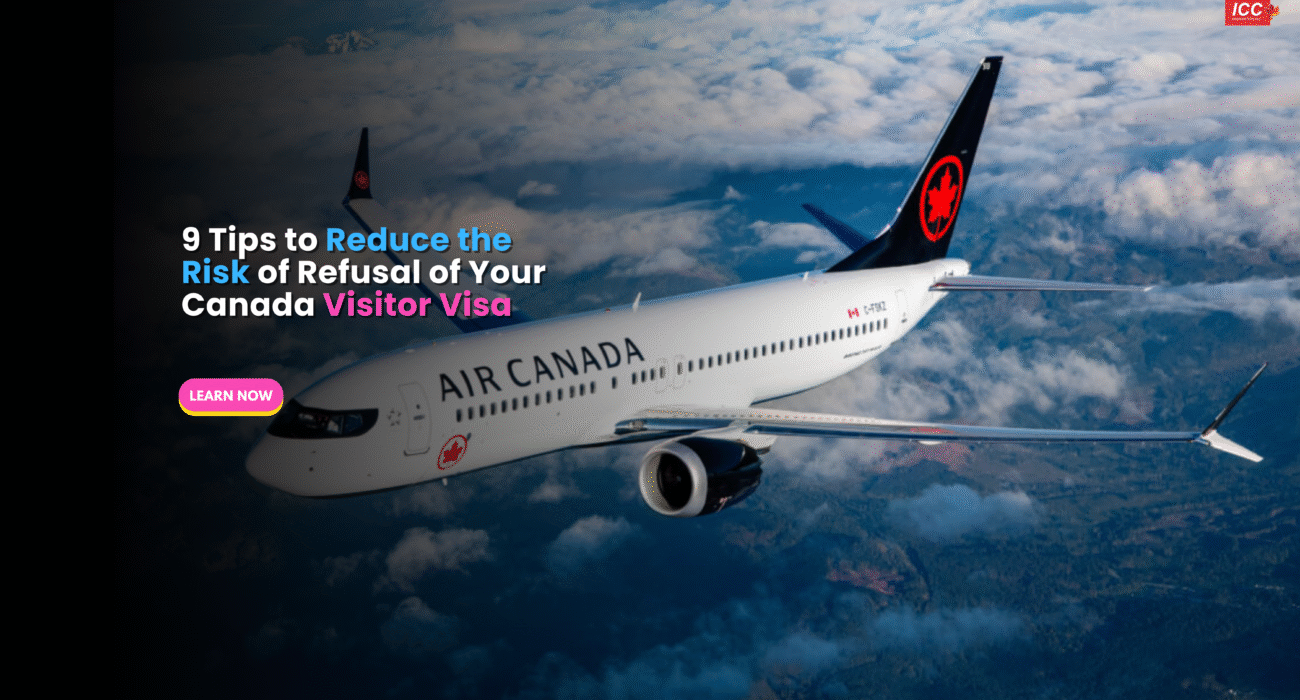Applying for a Canada visitor visa may seem like a straightforward process, but the reality is that many applicants face rejections each year. In fact, 2024 saw a noticeable rise in visa refusals, partly due to updated government policies and stricter requirements. To improve your chances of approval, it’s important to carefully prepare your application and avoid common mistakes.
Here are 9 practical tips to reduce the risk of refusal of your Canada visitor visa.
1. Ensure Your Application is Complete
Submitting incomplete or inaccurate forms is one of the most common reasons for rejection. You’ll need to complete forms such as IMM 5257 (Application for Temporary Resident Visa) and IMM 5707/5645 (Family Information Form). If a question doesn’t apply, always write “Not Applicable” rather than leaving it blank. Missing details may be interpreted as misrepresentation.
2. Provide All Required Documentation
Each applicant receives a personalized checklist, and failure to submit required documents can lead to refusal. Common documents include:
-
Valid passport
-
Financial proof (bank statements, pay stubs)
-
Travel itinerary or return ticket
-
Letter of invitation (if applicable)
-
Employment information
Submitting additional evidence, such as proof of property ownership or family ties, can further strengthen your case.
3. Show Strong Ties to Your Home Country
Immigration officers must be convinced you intend to return home after your visit. Evidence of ties can include:
-
Job confirmation letters
-
Proof of property ownership or lease agreements
-
Family dependency documents
-
Financial assets
The stronger your ties, the lower the risk of refusal.
4. Demonstrate Adequate Financial Support
Your application must show you can cover your expenses during your stay in Canada. Supporting documents may include:
-
Bank statements
-
Proof of assets
-
Employer letters
-
Sponsor’s financial documents (if someone else is funding your trip)
The amount required varies depending on the length and location of your stay.
5. Clearly State the Purpose of Visit
Be transparent about why you want to visit Canada. Whether it’s tourism, attending a family wedding, or a short business trip, support your purpose with documents such as event invitations, hotel bookings, or an itinerary. A vague or unclear purpose often leads to refusal.
6. Meet Health Requirements
Canada requires visitors to be in good health. In some cases, you may be asked to complete a medical exam. Applicants with health conditions that could pose a risk to public safety or overburden healthcare services may be refused. Providing medical documentation or undergoing an exam when requested can help overcome this barrier.
7. Address Criminal Inadmissibility (if applicable)
A past conviction doesn’t always mean automatic refusal. Options include applying for:
-
A Temporary Resident Permit (TRP)
-
Deemed rehabilitation (if enough time has passed since the offence)
-
Criminal rehabilitation
An immigration lawyer can also provide a legal opinion letter explaining your case.
8. Be Transparent About Travel History
If you’ve overstayed visas in the past or had refusals from other countries, disclose this information honestly. Provide explanations and proof that you’ve complied with travel rules since then. Concealing this history is considered misrepresentation and could lead to a five-year ban from Canada.
9. Resolve Residency Issues Before Applying
If you don’t have legal status in your current country of residence, your visitor visa is likely to be refused. It’s best to resolve these issues first. If you’re applying from a country facing political instability, provide strong evidence that you still plan to return after your visit.
Recent Changes to Visitor Visa Validity
As of November 2024, Immigration, Refugees and Citizenship Canada (IRCC) gave officers more discretion in issuing visitor visas. This means they now consider multiple factors—such as purpose of visit, financial resources, and health—before deciding whether to issue a single-entry or multiple-entry visa, and for how long.
This move replaces the earlier policy where 10-year multiple-entry visas were generally the default. Applicants should be prepared for shorter or more restrictive visas depending on their profile.
How ICC Immigration Can Help You Secure Your Future in Canada
At ICC Immigration, we know that navigating Canadian visa and immigration requirements can be overwhelming. A visitor visa may seem simple, but small mistakes can lead to refusals. Our team provides tailored support to ensure your application is strong and compliant.
We also help you plan beyond a visitor visa, offering clear pathways toward Permanent Residency in Canada.
Here’s how we can help:
-
Permanent Residency Applications: From Express Entry to Provincial Nominee Programs (PNPs), we manage your PR application with precision.
-
Work and Study Permits: Explore temporary options that can later lead to PR.
-
Family Sponsorships: Reunite with loved ones in Canada through expert guidance.
-
Expert Legal Advice: Avoid misrepresentation risks and ensure compliance with Canadian immigration laws.
Instead of relying on uncertain options like asylum claims, we help you build a secure and structured pathway toward your Canadian future.
Final Thoughts
Getting a Canada visitor visa approved isn’t just about filling forms—it’s about demonstrating strong ties, financial stability, and credibility. With recent policy changes, applications are scrutinized more than ever.
By following these 9 tips and working with trusted experts like ICC Immigration, you can significantly reduce your risk of refusal and increase your chances of a smooth entry into Canada.
📩 Contact ICC Immigration today for personalized guidance on your visitor visa or PR journey.




